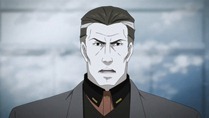 |
 |
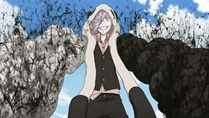 |
UN-GO certainly isn’t the best new series of the Fall season, but it just might be the most interesting.
Make no mistake, this episode was not as strong as the stellar fourth episode. The pacing felt very rushed, almost comically so, as the episode raced at blinding speed through a storyline packed with new characters and layers of detail. The mystery itself was not as interesting as the one involving the Sasa family and the RAI, and wasn’t terribly difficult to figure out. As a result of the frenzied pacing I thought the actions of the main cast were a bit too broad and extreme at times, especially Shinjuro.
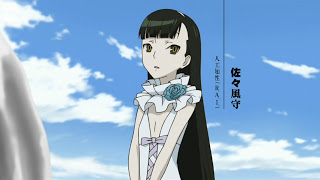 In spite of that, it was an awfully interesting 22 minutes. UN-GO is proving itself quite adept in the creation of a complex and interesting world for its characters to inhabit, a place where they struggle with the same moral and ethical dilemmas we do. But these are disguised just enough not to make us feel too uncomfortable watching them. It’s as if seeing yourself in a funhouse mirror – the image is grotesque, but alien enough that our minds can convince us we’re not really looking at ourselves. And Shimada Hakurou (Tanaka Masahiko) is just such an image. He’s a demagogic politician of the “Rising Sun Party” (heh) who glorifies war as a noble enterprise where humanity is ennobled by the sacrifices of brave young men who die for a cause. A fitting – if no doubt coincidental – episode to air on the eve of U.S. Veterans Day.
In spite of that, it was an awfully interesting 22 minutes. UN-GO is proving itself quite adept in the creation of a complex and interesting world for its characters to inhabit, a place where they struggle with the same moral and ethical dilemmas we do. But these are disguised just enough not to make us feel too uncomfortable watching them. It’s as if seeing yourself in a funhouse mirror – the image is grotesque, but alien enough that our minds can convince us we’re not really looking at ourselves. And Shimada Hakurou (Tanaka Masahiko) is just such an image. He’s a demagogic politician of the “Rising Sun Party” (heh) who glorifies war as a noble enterprise where humanity is ennobled by the sacrifices of brave young men who die for a cause. A fitting – if no doubt coincidental – episode to air on the eve of U.S. Veterans Day.
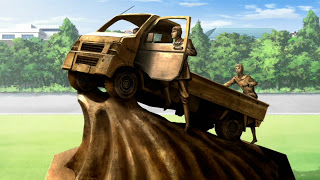 The actual mystery attached to Shimada is far less interesting than the issues he and his ideology raise, and the feelings – by far the strongest we’ve seen so far – they illicit in Shinjuro. When two men are found dead inside the sculpture Shimada has commissioned to honor three boys who died driving a truck full of explosives away from a crowd, Shinjuro immediately – and wrongly – blames Shimada. In fact the murderer is the sculptress, Youko, which is pretty easy to deduce from the clues in the episode. There’s also the matter of the splinter group the murdered men belonged to, formed by Shimada’s former bodyguard Yamamoto (Miyake Kenta). He was incensed that Shimada would use the deaths of the boys to his own financial gain. As well, there’s the question of how all this ties in with the government and it’s propagandist, Kaishou.
The actual mystery attached to Shimada is far less interesting than the issues he and his ideology raise, and the feelings – by far the strongest we’ve seen so far – they illicit in Shinjuro. When two men are found dead inside the sculpture Shimada has commissioned to honor three boys who died driving a truck full of explosives away from a crowd, Shinjuro immediately – and wrongly – blames Shimada. In fact the murderer is the sculptress, Youko, which is pretty easy to deduce from the clues in the episode. There’s also the matter of the splinter group the murdered men belonged to, formed by Shimada’s former bodyguard Yamamoto (Miyake Kenta). He was incensed that Shimada would use the deaths of the boys to his own financial gain. As well, there’s the question of how all this ties in with the government and it’s propagandist, Kaishou.
 As it did last week, UN-GO gives us a truly fascinating and difficult conversation full of complex moral questions – this time between Shinjuro and Shimada, on the subject of war and sacrifice. Those two conversations featured perhaps the best dialogue of any series this season, and here Shinjuro reveals himself to be somewhere between an idealist and a pacifist. Yet when Shimada – who was in fact innocent of the crime Shinjuro had accused him of – argues for the nobility of the boys who died (why does no one ask why all three had to be in the truck, if their sacrifice was noble and not a PR stunt ordered by Shimada?), Shinjuro is tongue-tied and unable to refute him. The wild card in the episode that pushes Shinjuro to self-understanding is Kazamori, who has remained in the sim of the young girl and taken to tagging along with Shinjuro and Inga (hopefully for good). Kazamori provides an interesting addition to the dynamic – a logical and detached view of human nature, Kazamori’s perspective is also subtly sentimental, suggesting a level of sentience higher than one might have thought.
As it did last week, UN-GO gives us a truly fascinating and difficult conversation full of complex moral questions – this time between Shinjuro and Shimada, on the subject of war and sacrifice. Those two conversations featured perhaps the best dialogue of any series this season, and here Shinjuro reveals himself to be somewhere between an idealist and a pacifist. Yet when Shimada – who was in fact innocent of the crime Shinjuro had accused him of – argues for the nobility of the boys who died (why does no one ask why all three had to be in the truck, if their sacrifice was noble and not a PR stunt ordered by Shimada?), Shinjuro is tongue-tied and unable to refute him. The wild card in the episode that pushes Shinjuro to self-understanding is Kazamori, who has remained in the sim of the young girl and taken to tagging along with Shinjuro and Inga (hopefully for good). Kazamori provides an interesting addition to the dynamic – a logical and detached view of human nature, Kazamori’s perspective is also subtly sentimental, suggesting a level of sentience higher than one might have thought.
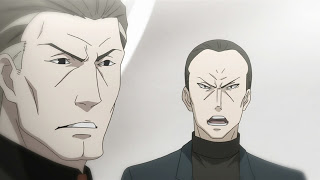 In clarifying the situation for Shinjuro, Kazamori also clarifies Shinjuro’s backstory for us. Shinjuro has contracted with Inga (Kazamori knows how they met, too, but only teases us with that) in order to feed Inga souls without Inga having to murder people. The price, it seems, is that Shinjuro consents to be haunted by Inga – an act of self-sacrifice, Kazamori points out, that’s analogous to the young men who died so that others might live (it’s also worth noting that Shinjuro quite explicitly states “I’m alive” in the episode). After revealing the identity of the killer, almost as an afterthought Shinjuro has Inga use yet another of his superpowers to reveal the true nature of the crime Shimada actually did commit.
In clarifying the situation for Shinjuro, Kazamori also clarifies Shinjuro’s backstory for us. Shinjuro has contracted with Inga (Kazamori knows how they met, too, but only teases us with that) in order to feed Inga souls without Inga having to murder people. The price, it seems, is that Shinjuro consents to be haunted by Inga – an act of self-sacrifice, Kazamori points out, that’s analogous to the young men who died so that others might live (it’s also worth noting that Shinjuro quite explicitly states “I’m alive” in the episode). After revealing the identity of the killer, almost as an afterthought Shinjuro has Inga use yet another of his superpowers to reveal the true nature of the crime Shimada actually did commit.
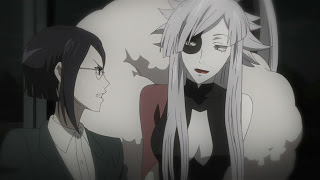 What a fascinating mess of an episode. The devil is in the details for this series – so far the mysteries have been inconsistent and the pacing even more so, but the overall world continues to grow in interest. I’m enjoying seeing the relationship of Shinjuro and Kaishou evolve. Both are geniuses of a sort – Shinjuro can look at a mystery and see the solution, whereas Kaishou’s genius is a sort of dark shadow of this. He can look at a mystery and instinctively see how it might best be used for propaganda.
What a fascinating mess of an episode. The devil is in the details for this series – so far the mysteries have been inconsistent and the pacing even more so, but the overall world continues to grow in interest. I’m enjoying seeing the relationship of Shinjuro and Kaishou evolve. Both are geniuses of a sort – Shinjuro can look at a mystery and see the solution, whereas Kaishou’s genius is a sort of dark shadow of this. He can look at a mystery and instinctively see how it might best be used for propaganda.
Next week sees our first completely anime-original story, so it should be interesting to see how it compares with the first five.
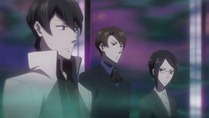 |
 |
 |
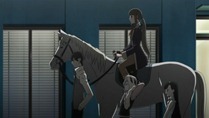 |
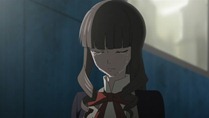 |
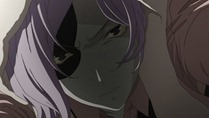 |
 |
 |
 |
 |
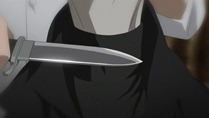 |
 |
 |
 |
 |






deafvader
November 11, 2011 at 6:17 pm………..
abandonedfactory
November 12, 2011 at 9:24 amGreat points. Un-go has a depth that many shows lack. I agree about it seeming rushed this time around, but it certainly goes further than many shows in trying to tackle some issues. It is odd that it masquerades as a mystery show. Maybe that helps it introduce the topics it wants to talk about, but it doesn't seem to be its real purpose.